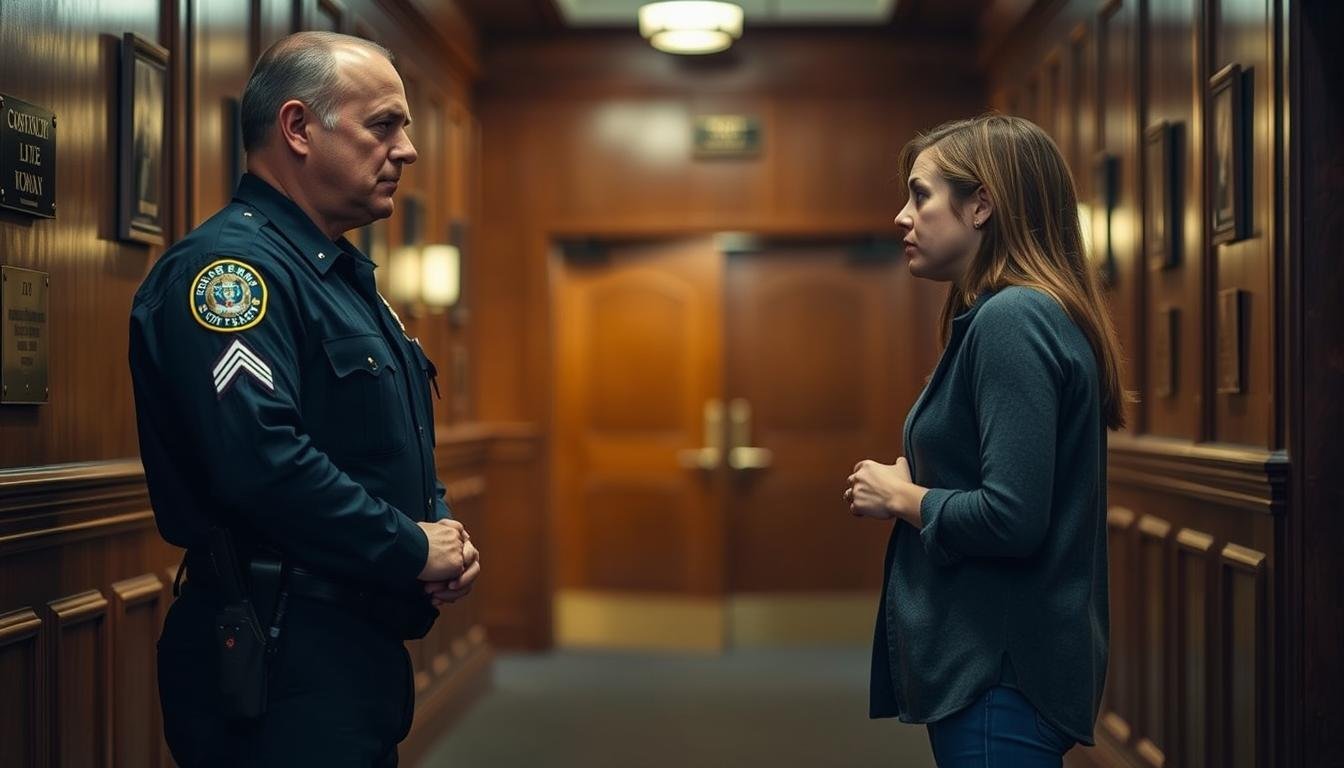Last updated on September 7th, 2025 at 10:00 am
Can a Cop Marry a Felon? When you think about love and law enforcement, you might wonder about marriage rules. Specifically, can a police officer marry someone with a felony? This question is common.
The rules for law enforcement marriage are complex. There’s no law saying a police officer can’t marry a felon. But, there are some issues that might come up.
It’s important to understand these issues. They can affect the officer’s job and personal life. Let’s look into the details to clear up any confusion.
Contents
- 1 Can a Cop Marry a Felon? Understanding the Legal Framework
- 2 Law Enforcement Agency Policies and Regulations
- 3 Agency-Specific Rules and Regulations
- 4 Career Implications for Police Officers
- 5 Navigating Practical Challenges for Mixed-Status Couples
- 6 Strategies for Overcoming Obstacles
- 7 Conclusion: Can a Cop Marry a Felon?
- 8 FAQ
- 8.1 Can a law enforcement officer marry someone with a felony conviction?
- 8.2 Are there federal laws that prohibit a cop from marrying a felon?
- 8.3 How do state laws affect a law enforcement officer’s marriage to a felon?
- 8.4 What are the implications of background checks for spouses of law enforcement officers?
- 8.5 Can marrying a felon affect a police officer’s career advancement?
- 8.6 Are there any agency-specific rules or regulations regarding spouses with felony convictions?
- 8.7 How can mixed-status couples navigate the practical challenges they may face?
- 8.8 What are some strategies for overcoming obstacles as a mixed-status couple?
Can a Cop Marry a Felon? Understanding the Legal Framework
Marrying a convicted felon as a law enforcement officer raises legal questions. Laws about such marriages vary by place. It’s key to know both federal and state laws.
Federal laws don’t directly stop cops from marrying felons. But, some laws might change their rights and duties. For example, laws about guns and secret info could be affected by a spouse’s felony.
Officers thinking about marrying a felon need to know the career risks. Many agencies have strict rules about a spouse’s background. This includes doing background checks.
These rules help keep info safe and ensure officers make fair decisions. A felon spouse could affect an officer’s job or career growth.
Some states limit felons’ rights, like owning guns. This could impact officers married to felons. For instance, an officer might not be able to have a gun at home if their spouse is a felon.
In short, marrying a felon is complex. Officers must understand the legal and career impacts. It’s a big decision that affects both their job and personal life.
Law Enforcement Agency Policies and Regulations
Deciding to marry someone with a felony record is tough for police officers. This is because of strict rules from law enforcement agencies. These rules can affect an officer’s job and personal life.
One key part of these rules is the background check for the spouse. A police officer spouse background check is needed to check for security risks. This check looks at the spouse’s criminal history, financial info, and more.
Agency-Specific Rules and Regulations
Each law enforcement agency has its own rules about officers’ spouses. Some agencies are very strict about officers marrying felons. Others are more flexible.
- Some agencies ask officers to share their spouse’s criminal history.
- Others might check on the spouse’s activities regularly.
- Some agencies have special rules for officers whose spouses are in jail or have a criminal past.
It’s vital for officers to know these law enforcement agency policies before marrying someone with a felony record. The couple should also think about how these rules might affect their lives.

Also, agency-specific rules can influence an officer’s career. An officer married to a felon might have limited career growth or extra scrutiny.
In summary, the rules for police officers marrying felons are complex and vary by agency. Officers need to think carefully about these rules before making such a big decision.
Career Implications for Police Officers
Police officers might face career challenges if they marry someone with a felony. The law enforcement marriage rules differ by department. But, the impact on their job can be big.
Marriage to a felon could make people question an officer’s judgment. It might seem like they can’t follow the law. This could hurt their reputation and trustworthiness in the department.
Officers who marry felons might deal with several job issues, including:
- They might not get promoted because of doubts about their integrity.
- They could get more attention from their bosses and colleagues, which might affect their work.
- They might be given less desirable jobs or roles.
It’s important for officers to know these career implications before making a decision. The impact on career advancement can be big. Officers need to think about their job and personal life carefully.
Police departments have rules about law enforcement marriage rules. Officers should learn about these rules to avoid problems.
Being in a relationship where one partner has a felony can be tough. It affects many parts of your life, like how you socialize and work. It’s not always easy.
As a mixed-status couple, you might facesocial challenges. People might not get your relationship, leading to problems with friends and family. You could feel judged or left out, making it hard to have a social life.
Strategies for Overcoming Obstacles
To deal with these issues, finding good strategies is key. Here are a few ideas:
- Find friends and family who get it and offer support.
- Teach others about mixed-status relationships to clear up misunderstandings.
- Keep your personal life private by setting boundaries with coworkers and acquaintances.
Work life can also be a challenge. As a cop, you might face criticism or bias from colleagues. Your partner’s felony could slow down your career or lead to more background checks.
To tackle theseprofessional challenges, try these strategies:
- Be ready to answer any questions from your employer or colleagues in a professional way.
- Highlight your achievements and the value you bring to your job as a cop.
- Look for support from professional groups or unions that can help and advocate for you.
Understanding the challenges and planning ahead can help you and your partner. It’s about finding ways to overcome obstacles and keep your relationship strong.
Conclusion: Can a Cop Marry a Felon?
Thinking about a law enforcement officer marrying a felon? It’s key to know the legal rules and what might happen. You need to look at law enforcement marriage rules and any felon marriage restrictions that could come up.
Choosing to marry someone with a felony can really affect a police officer’s job and personal life. It’s important to know your agency’s policies and the challenges you might face as a couple.
In the end, whether a cop can marry a felon depends on many things. This includes the laws in your area. Knowing these details helps you make a smart choice about your relationship.
See Also: Muzzleloader Ownership for Felons in Tennessee
FAQ
Can a law enforcement officer marry someone with a felony conviction?
Yes, a law enforcement officer can marry someone with a felony conviction. But, there might be some rules and restrictions based on local laws and policies.
Are there federal laws that prohibit a cop from marrying a felon?
No, there are no federal laws that say a cop can’t marry a felon. But, some states or agencies might have their own rules.
How do state laws affect a law enforcement officer’s marriage to a felon?
State laws differ, and some might have rules about cops marrying felons. It’s important to check the laws in your state.
What are the implications of background checks for spouses of law enforcement officers?
Spouses of cops might need background checks. A felony conviction could affect the clearance process or the officer’s security clearance.
Can marrying a felon affect a police officer’s career advancement?
Yes, marrying a felon could impact a police officer’s career. It might make others question the officer’s judgment or loyalty.
Are there any agency-specific rules or regulations regarding spouses with felony convictions?
Yes, police agencies have their own rules about spouses with felony convictions. It’s important to check with your agency.
Mixed-status couples can face challenges. Being aware of the issues, talking openly, and seeking support can help.
What are some strategies for overcoming obstacles as a mixed-status couple?
To overcome obstacles, be proactive and seek help from HR or supervisors. Knowing the laws and policies that affect you is also key.

Van Maldonado, born in California, holds a degree in Criminology and Police Science. Currently serving as an investigative officer at a local police station, he spends his leisure time writing insightful content for FelonScope.com.

